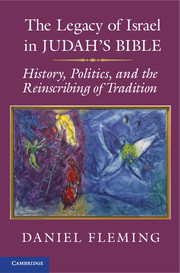Book contents
- Frontmatter
- Contents
- Preface
- Acknowledgments
- List of Abbreviations
- Part I Introduction
- Part II Israelite Content in the Bible
- 3 Writing from Judah
- 4 An Association of Peoples in the Land (The Book of Judges)
- 5 The Family of Jacob
- 6 Collective Israel and Its Kings
- 7 Moses and the Conquest of Eastern Israel
- 8 Joshua and Ai
- 9 Benjamin
- 10 Israelite Writers on Early Israel
- Part III Collaborative Politics
- Part IV Israel in History
- Bibliography
- Index of Biblical Texts
- Index of Near Eastern Texts
- Subject Index
- References
4 - An Association of Peoples in the Land (The Book of Judges)
Published online by Cambridge University Press: 05 August 2012
- Frontmatter
- Contents
- Preface
- Acknowledgments
- List of Abbreviations
- Part I Introduction
- Part II Israelite Content in the Bible
- 3 Writing from Judah
- 4 An Association of Peoples in the Land (The Book of Judges)
- 5 The Family of Jacob
- 6 Collective Israel and Its Kings
- 7 Moses and the Conquest of Eastern Israel
- 8 Joshua and Ai
- 9 Benjamin
- 10 Israelite Writers on Early Israel
- Part III Collaborative Politics
- Part IV Israel in History
- Bibliography
- Index of Biblical Texts
- Index of Near Eastern Texts
- Subject Index
- References
Summary
In the Bible's primary narrative, the first six books – Genesis through Joshua – are set in a time of origins, all cast as a prelude to actual life in the land of Israel. The long books of Samuel and Kings introduce the rule of kings as a new thing, with the initial success of David and Solomon followed by a confusing division into two, with David's line restricted to the smaller southern realm and the name “Israel” kept by the dominant northern one. Only the book of Judges, twenty-one chapters long, treats a period when Israel occupied a land of its own yet without kings and without a decisive unity. The book assembles a variety of unrelated stories, featuring people and places that are utterly distinct as we move from setting to setting. There is evident editorial effort to create from these a coherent narrative, especially by the formulation of a cycle of wrongdoing, divine wrath, and eventual rescue in Judg. 2:11–19, though this scheme is layered with other attempts.
As we try to disentangle the threads of editorial thought and to imagine what points of view they represent, one feature of the book stands out: the almost complete absence of content based in Judah. This is all the more impressive in light of the Judahite interest applied to the collection at two peripheral levels. The core set of heroic leaders is introduced by a brief, spare account of Othniel the Kenizzite (Judg. 3:7–11). As Caleb's younger brother, Othniel responds to the generic need of Israel by entering into generic combat with an enemy named Cushan-rishathaim. Victory results in forty years of peace. Nothing except the names offers any specifics; there is really no story. Caleb is linked to Judah, so that Othniel provides an indirect connection with this people before the proper narrative string begins with Ehud (3:12–30). At an even larger level, the book as such is introduced by explicit reference to Judah in chapter 1. In an independent account of Israel's first possession of the land, Judges 1 takes a tack different from that of Joshua by dwelling on the people's failures instead of on victory. This list of failures at the end of the chapter, however, is preceded by a celebration of Judah as the first to engage the enemy and the most successful among its brethren (1:1–20). The interest of Judah writers in the final framing of the book is transparent.
- Type
- Chapter
- Information
- The Legacy of Israel in Judah's BibleHistory, Politics, and the Reinscribing of Tradition, pp. 58 - 71Publisher: Cambridge University PressPrint publication year: 2012



